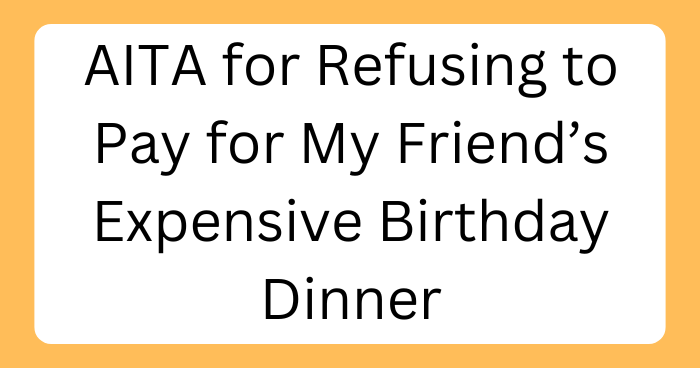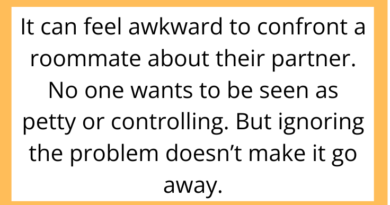AITA for Refusing to Pay for My Friend’s Expensive Birthday Dinner?
Splitting the bill at group dinners can sometimes lead to awkward situations. But for one woman, a friend’s fancy birthday celebration became the epicenter of a financial dispute when she refused to pay for an expensive meal. Was she truly justified in standing her ground, or did she cross a line and become unfair?
The Scene is Set: An Unexpected Price Tag

It started simply enough: a friend named Lisa was planning a fancy birthday dinner at an upscale restaurant. When the invitation came, I accepted, naturally assuming we would all pay for our own meals, just as we usually did. It’s the standard approach, isn’t it?
But the moment I saw the restaurant, a knot formed in my stomach. It was way out of my budget. Still, I desperately wanted to celebrate with her. So, I decided to be strategic. I ordered a modest entrée and a drink, watching others around the table go all out with multiple courses and expensive cocktails. I stuck to my plan, hoping to navigate the evening without financial stress.
The Moment of Truth: The Bill Arrives

The air felt light with post-dinner chatter, but a sense of anticipation hung in the air as the bill finally landed on the table. Then came the suggestion that immediately sent a jolt through the group. One of our friends proposed we split it evenly. My heart sank. Not just evenly for the shared appetizers, but evenly—including Lisa’s meal.
I couldn’t stay silent. I immediately objected, making my position clear: I was only willing to pay for what I ordered. That’s when the pressure mounted. Another friend chimed in, adding fuel to the fire, saying, “Come on, it’s Lisa’s birthday! We should all pitch in“. The implication was clear: I was being unreasonable.
Caught in the Crossfire: Silence Speaks Volumes

All eyes seemed to turn towards Lisa. How would the birthday girl respond to this unexpected tension? She stayed quiet. But her silence was loud. It was clear she expected me to contribute to covering her costly celebration. The unspoken demand hung heavy in the air.
But I had made my decision. Despite the mounting discomfort and the expectant looks, I refused. I calculated my portion based strictly on what I consumed, paid my portion, and made my exit.
The Aftermath: Judgement and Justification

I thought the awkwardness ended when I left the table. I was wrong. The conflict followed me. Now, some friends are calling me cheap. They’re saying I embarrassed Lisa. The judgment stings.
But deep down, I still don’t think it’s fair to be forced into paying for someone else’s expensive meal. I stuck to my budget and paid my way. Why should I be responsible for others’ ordering choices, especially at a restaurant I couldn’t comfortably afford in the first place?
The Community Weighs In: Was I the Asshole?

Posting about the ordeal, I found that the community was divided, yet many understood my position.
- Many people agreed that refusing to pay for an expensive birthday dinner was the right choice.
- The sentiment was strong: “You’re not responsible for covering someone else’s expensive tastes“. This validated my feeling exactly.
- Others pointed out the lack of clear communication beforehand. “If they wanted to treat Lisa, they should have said so in advance—not pressured you at the table“. Being put on the spot felt incredibly unfair.
- Ultimately, for many, it came down to simple fairness: “Fair is fair. You paid for your portion, and that’s all you owed“.
However, not everyone saw it my way.
- Some felt I had violated an unwritten social rule. “It’s common courtesy to chip in for a birthday dinner, especially for a close friend“.
- There was the suggestion that I should have simply avoided the situation altogether. “If money was tight, maybe you shouldn’t have gone in the first place“. But I wanted to celebrate my friend!
- Another point raised was my handling of the situation at the table. “You could have communicated earlier instead of making things awkward at the table“. But when is the right time to preemptively tell friends you won’t contribute to a gift or someone else’s meal when the plan wasn’t explicitly stated?
The Verdict: Standing My Ground or Ruining Everything?

While a few argued that my refusal made me look bad, the most common view was that no one should be forced to cover someone else’s bill. The pressure I felt at the table was exactly what many felt was unacceptable.
At the end of the day, celebrations should be enjoyable—moments of connection and happiness, not financial burdens. The situation was undeniably awkward and caused friction, leading to hurt feelings and judgment. But was paying for a meal I didn’t eat, at a restaurant I couldn’t afford, the right way to avoid that? For me, the answer was no.
Would you have done the same?



